《演讲的艺术》chapter1-5课后summary
演讲的艺术
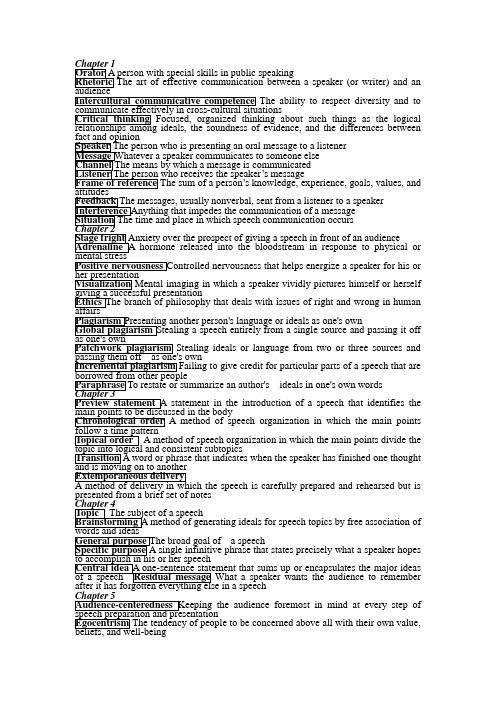
The art of effective communication between a speaker (or writer) and anThe ability to respect diversity and toFocused, organized thinking about such things as the logicalideals, the soundness of evidence, and the differences between’s messageThe sum of a person’s knowledge, experience, goals, values, andhormone released into the bloodstream in response to physical orMental imaging in which a speaker vividly pictures himself or herselfStealing ideals or language from two or three sources andFailing to give credit for particular parts of a speech that areTo restate or summarize an author's ideals in one's own wordsstatement in the introduction of a speech that identifies theA method of speech organization in which the main pointsA method of speech organization in which the main points divide theA word or phrase that indicates when the speaker has finished one thoughtpresented from a brief set of notesa speechWhat a speaker wants the audience to rememberthe audience foremost in mind at every step ofThe tendency of people to be concerned above all with their own value,Audience characteristics such as age, gender, education,Questions that require responses at fixed intervals along a scale ofthat allow respondents to answer however theymaterials used to support a speaker's ideas. The threeA story, narrative, or anecdote developed at some length toa speech together in a particular way to achieve aThe major points developed in the body of a speech. Most speechesmethod of speech organization in which the main pointsmethod of speech organization in which the main points follow amethod of speech organization in which the first mainof a problem and the second main point presents aA method of speech organization in which the main points divide theA word or phrase that indicates when a speaker has finished one thoughtstatement in the body of the speech that summarizes theA very brief statement that indicates where a speaker is in the speech or thatA question that the audience answers mentally rather than outstatement in the introduction of a speech that identifies the课后练习Chapter 4Topic :Studying abroadGeneral Purpose:To persuadeSpecific Purpose:To persuade the audience to study abroad will enhance your personal development,academic development,and career development.Central Idea:Main points: I. You should study abroad because it will enhance your personal development.II. You should study abroad because it will enhance your academic developmentIII. You should study abroad because it will enhance your career development.Topic : Events in triathlonGeneral purpose: To informSpecific purpose: To inform the audience of the three events in triathlon : swimming, cycling and running.Central Idea:Main points:The first event in triathlon is swimmingThe second event in triathlon is cycling.The third event in triathlon is running.I. The first major cause of airplane crashes is pilot error.II. The second major cause of airplane crashes is weather. Topical OrderIII. The third major cause of airplane crashes is mechanical failure.I. The peak of Mount Kilimanjaro has an arctic climate with snow,ice,,and violent winds.II. The middle of Mount Kilimanjaro has a rain forest climate with lush vegetation and diverse animal species.III. The base of Mount Kilimanjaro has a bushland climate with pastures and farming communities. Spatial OrderI. The Chinese film industry began in the early 20th century.II. The first golden period of Chinese cinema occurred during the 1930s.III. The second golden period occurred in the years after World War II.IV. The Chinese film industry was scaled back during the 1960s and 1970s.V. Today Chinese films are in another golden period of international acclaim.Chronological Order。
演讲的艺术

读书笔记模板
01 思维导图
03 目录分析 05 精彩摘录
目录
02 内容摘要 04 读书笔记 06 作者介绍
思维导图
关键字分析思维导图
极其重要
生活
结构
第章
演讲词
艺术
应变
艺术
舞台
世纪 技巧
语言
方式
演讲
开头
选材
说服力
临场
安排
内容摘要
本书告诫年轻人,比事业成功更重要的是首先要学会生活,也就是说,为自己寻找最佳的生活方式极其重要。 新的世纪为我们提供了广阔的舞台,也为人们提供了更多的施展自己才能的机会,值得人们去努力奋斗、积极进 取,也足以使那些不思进取、裹足不前的人振奋精神,去获取辉煌的成功!
0 4
第9章慷慨 激昂:演讲 鼓动人心的 技巧
0 6
第11章临 场应变:控 制现场气氛 的技巧
0 5
第10章语 言修辞:强 化演讲艺术 的技巧
读书笔记
这是《演讲的艺术》的读书笔记模板,可以替换为自己的心得。
精彩摘录
这是《演讲的艺术》的读书笔记模板,可以替换为自己的精彩内容摘录。
作者介绍
这是《演讲的艺术》的读书笔记模板,暂无该书作者的介绍。
谢谢观看
目录分析Βιβλιοθήκη 1第1章前言第 2 章 以 预 致 胜 :2
演讲的准备与 主题确立
3 第3章丰富精当:
演讲选材的艺 术
4 第4章严谨完整:
演讲词结构安 排的艺术
5 第5章先声夺人:
演讲开头的艺 术
0 1
第6章铿锵 刚劲:演讲 的结尾艺术
0 2
第7章以理 服人:演讲 的说服力技 巧
演讲的艺术卡耐基
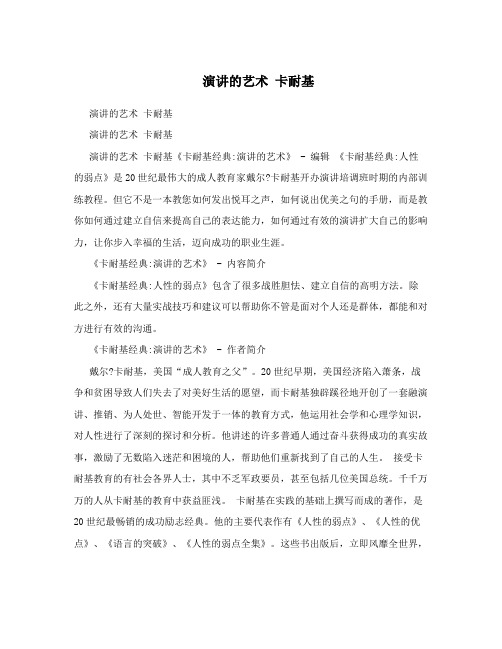
演讲的艺术卡耐基演讲的艺术卡耐基演讲的艺术卡耐基演讲的艺术卡耐基《卡耐基经典:演讲的艺术》 - 编辑《卡耐基经典:人性的弱点》是20世纪最伟大的成人教育家戴尔?卡耐基开办演讲培调班时期的内部训练教程。
但它不是一本教您如何发出悦耳之声,如何说出优美之句的手册,而是教你如何通过建立自信来提高自己的表达能力,如何通过有效的演讲扩大自己的影响力,让你步入幸福的生活,迈向成功的职业生涯。
《卡耐基经典:演讲的艺术》 - 内容简介《卡耐基经典:人性的弱点》包含了很多战胜胆怯、建立自信的高明方法。
除此之外,还有大量实战技巧和建议可以帮助你不管是面对个人还是群体,都能和对方进行有效的沟通。
《卡耐基经典:演讲的艺术》 - 作者简介戴尔?卡耐基,美国“成人教育之父”。
20世纪早期,美国经济陷入萧条,战争和贫困导致人们失去了对美好生活的愿望,而卡耐基独辟蹊径地开创了一套融演讲、推销、为人处世、智能开发于一体的教育方式,他运用社会学和心理学知识,对人性进行了深刻的探讨和分析。
他讲述的许多普通人通过奋斗获得成功的真实故事,激励了无数陷入迷茫和困境的人,帮助他们重新找到了自己的人生。
接受卡耐基教育的有社会各界人士,其中不乏军政要员,甚至包括几位美国总统。
千千万万的人从卡耐基的教育中获益匪浅。
卡耐基在实践的基础上撰写而成的著作,是20世纪最畅销的成功励志经典。
他的主要代表作有《人性的弱点》、《人性的优点》、《语言的突破》、《人性的弱点全集》。
这些书出版后,立即风靡全世界,先后被翻译成几十种文字,被誉为“人类出版史上的奇迹”,无数读者由此走上了成功之路。
《卡耐基经典:演讲的艺术》 - 媒体评论成功其实如此简单,只要你遵循卡耐基先生这些简单适用的人际标准,你就能获得成功。
——马克?维克多?汉森卡耐基从上个世纪初就开始讲授他的成人训练课程,开创了美国的成人教育运动。
他的成功哲学与处世技巧对当今时代的年轻人来说,仍是一个永恒的人生课题。
演讲的艺术 chapter 5

McGraw-Hill
© 2007 Stephen E. Lucas. All rights reserved.
McGraw-Hill
© 2007 Stephen E. Lucas. All rights reserved.
Slide 11
Group Membership
• Group affiliations of your audience may provide excellent clues about your listeners’ interests and attitudes.
Slide 4
Audience-Centeredness
• Audience-centeredness- Keeping the audience foremost in the mind at every step of speech preparation and presentation. • Keep several questions in mind:
Slide 13
Size
• The larger the audience, the more formal your presentation must be.
• Audience size will have the greatest impact on your delivery, but it may also affect your language, choice of appeals, and use of visual aids.
演讲的艺术智慧树知到课后章节答案2023年下浙江工业大学

演讲的艺术智慧树知到课后章节答案2023年下浙江工业大学浙江工业大学第一章测试1.演讲是指在公众场合,以有声语言为主要手段,以为辅助手段,针对某个具体的问题,非常地、完整地发表自己的见解和主张,阐明事理或者抒发情感,进行( )、的一种语言交际活动。
A:宣传、鼓动B:宣传、交流C:传播、交流D:传播、鼓动答案:宣传、鼓动2.战国末期,()一人身佩六国相印,以雄辩的口才一一说服秦以外的六国。
A:荀况B:张仪C:李斯D:苏秦答案:苏秦3.演讲的目的在于表现自己、宣传观点和改革社会。
()A:对 B:错答案:错4.演讲从传播内容划分可以分为政治演讲、社会生活演讲、司法演讲和学术演讲等。
()A:对 B:错答案:对5.演讲的有哪些功能?()A:情感交流功能B:引导舆论功能C:传播知识功能D:宣传鼓动功能答案:情感交流功能;引导舆论功能;传播知识功能;宣传鼓动功能第二章测试1.以下哪种情景更适合背诵式演讲()。
A:采访B:会议发言C:专业会议D:祝酒词答案:祝酒词2.()是集敏锐的感觉和丰富的知识为一体的能力?A:质疑能力B:洞察力C:即兴表达能力D:逻辑能力答案:洞察力3.背诵演讲最基础的就是背熟台词。
()A:错 B:对答案:对4.演讲中所使用的证据和论证,并不适用于其他沟通场合。
()A:错 B:对答案:错5.语气是演讲者()等起伏变化的语音形式。
A:态度B:心境C:情感D:立场答案:态度;心境;情感;立场第三章测试1.做发声练习是,需要注意()放松,吸气不要过满,两肋打开撑住,但不能僵死。
A:鼻腔B:口腔C:胸部D:嘴唇答案:胸部2.重音的表达方法可以分为:强弱法、快慢法和()。
A:对比法B:节奏法C:高低法D:虚实法答案:高低法3.睡眠不足,容易致使肌肉疲劳,造成声带嘶哑。
()A:对 B:错答案:错4.张颂先生曾说过:语气,是思想感情支配喜爱具体语句的声音形式。
()A:对 B:错答案:对5.除了常规的呼吸,还有三种辅助的呼吸方法,分别是()。
演讲的艺术 chapter

McGraw-Hill
© 2007 Stephen E. Lucas. All rights reserved.
Slide 12
Testimony
• Direct quotation • Paraphrase
McGraw-Hill
© 2007 Stephen E. Lucas. All rights reserved.
Tea is popular.
Large
Tea is second only to
quantities of water as the world’s most
tea are
consumed beverage. More
consumed tea is consumed each year
by people than all other
McGraw-Hill
© 2007 Stephen E. Lucas. All rights reserved.
Slide 15
Evaluating Electronic Information
• Purpose • Expertise • Objectivity • Accuracy • Timeliness
around the manufactured drinks in
globe.
the world put together,
including coffee,
chocolate, soft drinks and
alcohol. Total tea
consumption is 4 billion
kilograms annually.
testimony
McGraw-Hill
《请你讲重点 卡耐基魅力演讲的艺术》读书笔记思维导图

本章小结
第十五章 如何让听众行动起来
01
用实力获得 自信
02
谈谈自己的 亲身经历
03
恰如其分的 介绍
04
蓝色草与山 核桃木灰
06
让一种欲望 战胜另一种 欲望
05
帕特森如何 应对异议
作者是否成功运用 了上文讲述的方法?
那些决定我们行动 的欲望
本章小结
第十六章 如何润饰辞藻
01
马克·吐温 的词语妙招
3 令人震惊的事
实具有引人注 意的力量
4 看似随意的开
场白背后蕴含 的价值
5
本章小结
第十章 如何瞬间吸引听众
01
蜂蜜与双枪 手
02
洛奇参议员 的办法
03
最好的辩论 是做出解释
04
帕特里 克·亨利如 何发起轰动 性演说
06
本章小结
05
莎士比亚剧 作中最精彩 的演说
第十一章 如何结束演讲
总结要点 呼吁行动
怎样重复才 有用
01
如何把事实 组织起来
02
如何记日期
03
如何记住演 讲的要点
04
演讲过程中 突然卡壳怎 么办?
06
本章小结
05
我们无法提 高自己对所 有事物的记 忆力
第五章 不要让听众睡着
01
一定要说你 特别想说的 东西
02
取胜的秘密
03
林肯用演说 打赢了官司
04
表现出热情
06
黄鼠狼词语 与洋葱
05
如果听众睡 着,该如何 救场?
了解你的听众
热爱你的听众
本章小结
第六章 成功演讲的基本要素
01
《演讲的艺术1》

3. Factors in Audience Analysis
3. Factors in Audience Analysis
Physical Setting:
—When you are invited to speak, don’t be shy about asking questions of the person who arranged the speech. If possible, look over the room a few days in advance, or else arrive early on the day of your speech to inspect the room. —When faced with an audience that is potentially hot, sleepy, and cross, do your best to make the speech as interesting and lively as you can. —Don’t let yourself be influenced by the poor physical setting.
—The more competent the listener believe a speaker to be, the more likely they are to accept what the speaker says. —The more listeners believe that a speaker has their best interests at heart, the more likely they are to respond positively to the speaker’s message.
(完整版)《演讲的艺术》chapter1-5课后summary

(完整版)《演讲的艺术》chapter1-5课后summaryChapter1 speaking in publicPeople throughout history have used public speaking as a vital means of communication and empowerment. Because you will live the rest of your life in a globalized world, the need for English public speaking will almost surely touch you at some time.To be successful giving speeches in English, you need to be culturally competent communicator. You must show respect for the cultural values and expectations of the people who come to hear you. This dose not mean that you have to devalue your own culture. There is no inherent conflict between being a competent English public speaker and being fully Chinese.Because public speaking involves the use of English as a working language, it requires critical thinking skills. Critical thinking helps you organize your ideas, spot weaknesses in other people’s reasoning, and avoid them in your own.There are many similarities between public speaking and conversation, but there are also important differences. First, public speaking requires more detailed preparation than ordinary conversation. Second, it requires more formal language. Third, it demands that speakers adjust their voices to the larger audience and work at avoiding distracting physical mannerisms and verbal habits.The speech communication process includes seven elements: speaker, message, channel, listener, feedback, interference, and situation. The interaction of these elements determines the outcome of any public speech.Chapter2 speaking confidently and ethicallystage fright is an issue for public speakers in all countries.Rather than trying to eliminate every trace of stage fright, you should try to transform it into positive energy. To some extent, this will happen naturally as you gain experience as a speaker, but you should also think positively, prepare thoroughly, visualize yourself giving a successful speech, remember that most nervousness is not visible to the audience, and think of your speech as communication rather than as a performance in which you must do everything perfectly Because public speaking is a form of power, it carries with it heavy ethical responsibili ties. There are four basic guidelines for ethical speechmaking. The first is to make sure your goals are ethically sound. The second is to be fully prepared for each speech. The third is to be honest in what you say. The fourth is to put ethical principles into practice at all timesOf all the ethical lapses a speaker can commit, few are more serious than plagiarism lobal plagiarism is lifting a speech entirely from a single source. Patchwork plagiarism involves cutting and pasting a speech from a limited number of sources. Incremental pla giarism occurs when a speaker fails to give credit for specific quotations and paraphrases that are borrowed from other people Because it is so easy to copy information from the Internet, it poses special challenges with regard to plagiarism. If you don't cite Internet sources, you are just as guilty of plagia- rism as if you take information from print sources without proper citation. As you research your speeches, be sure to take accurate notes of the Internet sources you use so you can identify them in your speechChapter3 giving your first speechOne of your first assignments will be to present an introductory speech, either a speech of self-introduction or aspeech introducing a classmate. Focus the speech on a limited number of ideas and be creative in developing them. Use interesting supporting materials and present them in colorful, descriptive language.When organizing the speech, make sure you have a clear introduction, body, and conclusion. Most introductory speeches fall naturally into chronological or topical order. Using clear transitions will help your audience follow you from point to point.Although you will write a complete manuscript or outline of your speech when preparing it, you should deliver it extemporaneously. This means you have rehearsed fully and can present your talk from a brief set of speaking notes. Concentrate on establishing eye contact with the audience and on speaking in a dynamic, engaged tonof voiceChapter4 selecting a topic and purposeThe first step in speechmaking is choosing a topic. If you have trouble picking a topic, you can use clustering, a personal inventory, or an Internet search to come up with something that is right for you.The general purpose of your speech will usually be to inform or to persuade. When your general purpose is to inform, your goal is to communicate information clearly, accurately, and interestingly. When your general purpose is to persuade, your goal is to win listeners over to your point of viewOnce you know your topic and general purpose, you must focus on a specific purpose statement that indicates precisely what your speech seeks to achieve. The specific purpose statement should (1) be a full infinitive phrase; (2) be worded as a statement, not a question:(3) avoid figurative language;(4) not be vague or general; (5) be appropriate for your audience; and(6)be achievable in the allotted time.The central idea is a concise statement of what you will say in your speech, and it usually crystallizes in your thinking after you have done your research and have decided on the main points. In most cases, it encapsulates the main points in a single declarative sentence Chapter5 analyzing the audience Good speakers are audience-centered. When working on your speeches, keep three questions in mind: To whom am I speaking? What do I want them to know, believe, or do as result of my speech? What is the most effective way of composing and presenting my speech to accomplish that aim?People are egocentric. They typically approach speeches with one question uppermost in mind: "why is this important to me?" Therefore you need to study your audience and adapt your speech to their beliefs and interests.The major factors to consider in audience analysis are size, physical setting, demographic traits disposition toward the topic, disposition toward the speaker, and disposition toward the occasion, For speeches outside the classroom, you can get information about the audience by asking the person who invites you to speak. For classroom speeches, you can circulate an audience-analysis questionnaire.Once you complete the audience analysis, you must adapt your speech so it will be clear and convincing. Try to hear the speech as your listeners will. Anticipate questions and objections, and try to answer them in advance. When you deliver the speech, keep an eye out for audience feedback, and adjust your remarks in response. After the speech, think about your audience's response and about changes you would make if you were delivering the speech again。
演讲的艺术(第八版)-个人笔记

演讲的艺术(第八版)-个人笔记演讲的艺术(第八版)史蒂芬.E.卢卡斯/著俞振伟/译第一部分演讲与倾听第一章公共演讲公共演讲,即将你个人观点通过与他人分享并影响他人的态度从而达到公共化的一种途径。
通过演讲传播他们的思想,扩大他们的影响。
公共演讲在职业发展中非常重要,在日常生活中同样重要。
关键在于,公共演讲是一种能量赋予的形式。
他有可能促使人们十分关心的一些事情产生变化,实际情况的确经常如此。
在演讲课上掌握方法和策略。
实际上,与人讲话时,已经开始运用相当宽的知识范畴内的技能了。
1、逻辑清晰地组织自己的思想。
2、根据不同对象剪裁自己的话。
3、讲故事要达到最好效果。
你会不断调整自己的用词和语调,以便获得最佳效果。
4、接受听众的反馈。
意识到他的语言、面部和身体的反应。
你每天都在看似随意的谈话中所做这些事情,每天都做好了好多次,你根本没有意识到,自己已经具备了这些沟通技巧了。
所有这些都是你做公共演讲时必不可少的重要技巧。
公共演讲与日常对话的区别1、公共演讲结构更严谨。
公共演讲对演讲人有很严格的时间限制,多数情况下,不允许听众提问或发表评论打断演讲。
演讲人必须通过演讲本身实现自己实现自己的传达目标。
在准备演讲稿时,演讲人必须预计哪些部分有可能在听众中产生疑问,需要在演讲中回答这些疑问。
因此,公共演讲需要事先先做精心的准备。
2、公共演讲要求更正式的用语。
俚语、行话和不规范的表达在公共演讲中站不住脚。
3、公共演讲要求使用“演讲”的说话方式。
非正式谈话时,人们会保持闲散的姿势,使用很多语气词、做很多停顿(嗯、啊、这么、那么,等等)。
而有效的演讲人会调整自己的嗓音,以便让所有听众都能清晰的听到;站的直挺,避免出现让人走神的个人习惯动作和习惯用语。
树立信心:你的演讲课紧张纯属正常76%的人在走上讲台前也会怯场。
可是,紧张是一个健康的信号,表明他们在“心理上做好了准备”,准备让演讲取得成功。
肾上腺素水平急剧上升,使你心跳加快、双手颤抖、额头冒汗。
(完整版)《演讲的艺术》chapter1-5课后summary
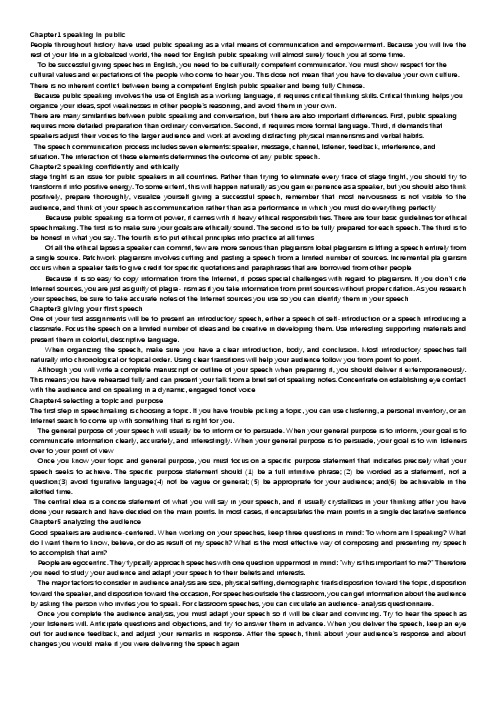
Chapter1 speaking in publicPeople throughout history have used public speaking as a vital means of communication and empowerment. Because you will live the rest of your life in a globalized world, the need for English public speaking will almost surely touch you at some time.To be successful giving speeches in English, you need to be culturally competent communicator. You must show respect for the cultural values and expectations of the people who come to hear you. This dose not mean that you have to devalue your own culture. There is no inherent conflict between being a competent English public speaker and being fully Chinese.Because public speaking involves the use of English as a working language, it requires critical thinking skills. Critical thinking helps you organize your ideas, spot weaknesses in other people’s reasoning, and avoid them in your own.There are many similarities between public speaking and conversation, but there are also important differences. First, public speaking requires more detailed preparation than ordinary conversation. Second, it requires more formal language. Third, it demands that speakers adjust their voices to the larger audience and work at avoiding distracting physical mannerisms and verbal habits.The speech communication process includes seven elements: speaker, message, channel, listener, feedback, interference, and situation. The interaction of these elements determines the outcome of any public speech.Chapter2 speaking confidently and ethicallystage fright is an issue for public speakers in all countries. Rather than trying to eliminate every trace of stage fright, you should try to transform it into positive energy. To some extent, this will happen naturally as you gain experience as a speaker, but you should also think positively, prepare thoroughly, visualize yourself giving a successful speech, remember that most nervousness is not visible to the audience, and think of your speech as communication rather than as a performance in which you must do everything perfectly Because public speaking is a form of power, it carries with it heavy ethical responsibili ties. There are four basic guidelines for ethical speechmaking. The first is to make sure your goals are ethically sound. The second is to be fully prepared for each speech. The third is to be honest in what you say. The fourth is to put ethical principles into practice at all timesOf all the ethical lapses a speaker can commit, few are more serious than plagiarism lobal plagiarism is lifting a speech entirely from a single source. Patchwork plagiarism involves cutting and pasting a speech from a limited number of sources. Incremental pla giarism occurs when a speaker fails to give credit for specific quotations and paraphrases that are borrowed from other people Because it is so easy to copy information from the Internet, it poses special challenges with regard to plagiarism. If you don't cite Internet sources, you are just as guilty of plagia- rism as if you take information from print sources without proper citation. As you research your speeches, be sure to take accurate notes of the Internet sources you use so you can identify them in your speechChapter3 giving your first speechOne of your first assignments will be to present an introductory speech, either a speech of self-introduction or a speech introducing a classmate. Focus the speech on a limited number of ideas and be creative in developing them. Use interesting supporting materials and present them in colorful, descriptive language.When organizing the speech, make sure you have a clear introduction, body, and conclusion. Most introductory speeches fall naturally into chronological or topical order. Using clear transitions will help your audience follow you from point to point.Although you will write a complete manuscript or outline of your speech when preparing it, you should deliver it extemporaneously. This means you have rehearsed fully and can present your talk from a brief set of speaking notes. Concentrate on establishing eye contact with the audience and on speaking in a dynamic, engaged tonof voiceChapter4 selecting a topic and purposeThe first step in speechmaking is choosing a topic. If you have trouble picking a topic, you can use clustering, a personal inventory, or an Internet search to come up with something that is right for you.The general purpose of your speech will usually be to inform or to persuade. When your general purpose is to inform, your goal is to communicate information clearly, accurately, and interestingly. When your general purpose is to persuade, your goal is to win listeners over to your point of viewOnce you know your topic and general purpose, you must focus on a specific purpose statement that indicates precisely what your speech seeks to achieve. The specific purpose statement should (1) be a full infinitive phrase; (2) be worded as a statement, not a question:(3) avoid figurative language;(4) not be vague or general; (5) be appropriate for your audience; and(6) be achievable in the allotted time.The central idea is a concise statement of what you will say in your speech, and it usually crystallizes in your thinking after you have done your research and have decided on the main points. In most cases, it encapsulates the main points in a single declarative sentence Chapter5 analyzing the audienceGood speakers are audience-centered. When working on your speeches, keep three questions in mind: To whom am I speaking? What do I want them to know, believe, or do as result of my speech? What is the most effective way of composing and presenting my speech to accomplish that aim?People are egocentric. They typically approach speeches with one question uppermost in mind: "why is this important to me?" Therefore you need to study your audience and adapt your speech to their beliefs and interests.The major factors to consider in audience analysis are size, physical setting, demographic traits disposition toward the topic, disposition toward the speaker, and disposition toward the occasion, For speeches outside the classroom, you can get information about the audience by asking the person who invites you to speak. For classroom speeches, you can circulate an audience-analysis questionnaire.Once you complete the audience analysis, you must adapt your speech so it will be clear and convincing. Try to hear the speech as your listeners will. Anticipate questions and objections, and try to answer them in advance. When you deliver the speech, keep an eye out for audience feedback, and adjust your remarks in response. After the speech, think about your audience's response and about changes you would make if you were delivering the speech again。
《演讲的艺术》
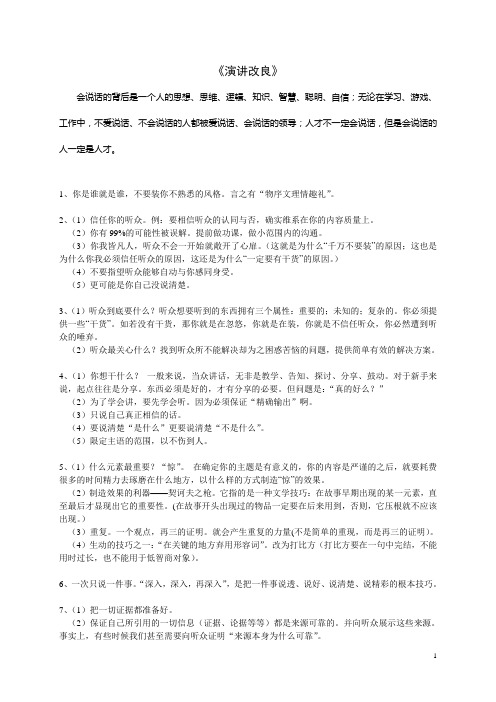
《演讲改良》会说话的背后是一个人的思想、思维、逻辑、知识、智慧、聪明、自信;无论在学习、游戏、工作中,不爱说话、不会说话的人都被爱说话、会说话的领导;人才不一定会说话,但是会说话的人一定是人才。
1、你是谁就是谁,不要装你不熟悉的风格。
言之有“物序文理情趣礼”。
2、(1)信任你的听众。
例:要相信听众的认同与否,确实维系在你的内容质量上。
(2)你有99%的可能性被误解。
提前做功课,做小范围内的沟通。
(3)你我皆凡人,听众不会一开始就敞开了心扉。
(这就是为什么“千万不要装”的原因;这也是为什么你我必须信任听众的原因,这还是为什么“一定要有干货”的原因。
)(4)不要指望听众能够自动与你感同身受。
(5)更可能是你自己没说清楚。
3、(1)听众到底要什么?听众想要听到的东西拥有三个属性:重要的;未知的;复杂的。
你必须提供一些“干货”。
如若没有干货,那你就是在忽悠,你就是在装,你就是不信任听众,你必然遭到听众的唾弃。
(2)听众最关心什么?找到听众所不能解决却为之困惑苦恼的问题,提供简单有效的解决方案。
4、(1)你想干什么?一般来说,当众讲话,无非是教学、告知、探讨、分享、鼓动。
对于新手来说,起点往往是分享。
东西必须是好的,才有分享的必要。
但问题是:“真的好么?”(2)为了学会讲,要先学会听。
因为必须保证“精确输出”啊。
(3)只说自己真正相信的话。
(4)要说清楚“是什么”更要说清楚“不是什么”。
(5)限定主语的范围,以不伤到人。
5、(1)什么元素最重要?“惊”。
在确定你的主题是有意义的,你的内容是严谨的之后,就要耗费很多的时间精力去琢磨在什么地方,以什么样的方式制造“惊”的效果。
(2)制造效果的利器——契诃夫之枪。
它指的是一种文学技巧:在故事早期出现的某一元素,直至最后才显现出它的重要性。
(在故事开头出现过的物品一定要在后来用到,否则,它压根就不应该出现。
)(3)重复。
一个观点,再三的证明。
就会产生重复的力量(不是简单的重现,而是再三的证明)。
演讲的艺术_第四章 让你的演讲充满魅力
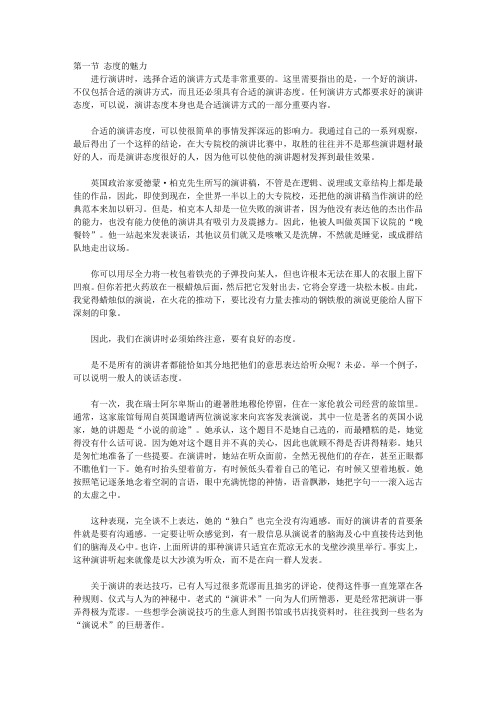
第一节态度的魅力进行演讲时,选择合适的演讲方式是非常重要的。
这里需要指出的是,一个好的演讲,不仅包括合适的演讲方式,而且还必须具有合适的演讲态度。
任何演讲方式都要求好的演讲态度,可以说,演讲态度本身也是合适演讲方式的一部分重要内容。
合适的演讲态度,可以使很简单的事情发挥深远的影响力。
我通过自己的一系列观察,最后得出了一个这样的结论,在大专院校的演讲比赛中,取胜的往往并不是那些演讲题材最好的人,而是演讲态度很好的人,因为他可以使他的演讲题材发挥到最佳效果。
英国政治家爱德蒙·柏克先生所写的演讲稿,不管是在逻辑、说理或文章结构上都是最佳的作品,因此,即使到现在,全世界一半以上的大专院校,还把他的演讲稿当作演讲的经典范本来加以研习。
但是,柏克本人却是一位失败的演讲者,因为他没有表达他的杰出作品的能力,也没有能力使他的演讲具有吸引力及震撼力。
因此,他被人叫做英国下议院的“晚餐铃”。
他一站起来发表谈话,其他议员们就又是咳嗽又是洗牌,不然就是睡觉,或成群结队地走出议场。
你可以用尽全力将一枚包着铁壳的子弹投向某人,但也许根本无法在那人的衣服上留下凹痕。
但你若把火药放在一根蜡烛后面,然后把它发射出去,它将会穿透一块松木板。
由此,我觉得蜡烛似的演说,在火花的推动下,要比没有力量去推动的钢铁般的演说更能给人留下深刻的印象。
因此,我们在演讲时必须始终注意,要有良好的态度。
是不是所有的演讲者都能恰如其分地把他们的意思表达给听众呢?未必。
举一个例子,可以说明一般人的谈话态度。
有一次,我在瑞士阿尔卑斯山的避暑胜地穆伦停留,住在一家伦敦公司经营的旅馆里。
通常,这家旅馆每周自英国邀请两位演说家来向宾客发表演说,其中一位是著名的英国小说家,她的讲题是“小说的前途”。
她承认,这个题目不是她自己选的,而最糟糕的是,她觉得没有什么话可说。
因为她对这个题目并不真的关心,因此也就顾不得是否讲得精彩。
她只是匆忙地准备了一些提要。
在演讲时,她站在听众面前,全然无视他们的存在,甚至正眼都不瞧他们一下。
仁者无敌——演讲的艺术(共18张精选PPT)

一、演讲是一门艺术
1.演讲= “讲” + “演” 2.成功演讲的三要素
※ 深刻的哲理
※ 理性思维的形象性
※ 情感的感染性
二、如何准备专题演讲
1.选好题目
联系现实中存在的现象和问题
自己熟悉、有见地的问题 思考题:你会选择什么样的题目呢?
二、如何准备专题演讲
(二)了解- 听众 听众永远是演讲者的上帝 听众关注什么,喜欢什么
(五)认真- 练讲
1. 练习的内容
走上讲台、 呼吸、目光、面部表情
手势
2. 练习的方法
利用录音机、摄像机
“益智游戏 ”:站着思考
三、如何有效地登台演讲
(一)充满- 信心 1. 充分准备、看清自己的优势
2. 想象比赛的பைடு நூலகம்景
3. 恐惧时回避观众目光
三、如何有效地登台演讲
(二)注意- 给人的印象
1. 演讲者的仪表
三、如何有效地登台演讲
(五)注意- 态度
三、如何有效地登台演讲
1. 喜欢产生喜欢 你们大家都是各国留学生,
听众关注什么,喜欢什么 今天来的人不少,看样子大抵有五分之八啦! 热情洋溢使听众兴致勃勃 不要长时间专注于一个人
2. 自信使听众产生信心 你们大家都是各国留学生,
☼ 我要向所有的朋友,宣布这一好消息。
演讲是什么
诸位、各位、在下各位: 今天是什么天气?今天就是讲演的天气,来宾十分茂盛,
敝人也实在是感冒。
今天来的人不少,看样子大抵有五分之八啦!
今天兄弟召集大家来训一训!兄弟有说的不对的, 大家应该互相原谅。因为兄弟和你们
大家比不了,兄弟我是大老粗,你们大家
都是从笔杆子里爬出来的,我是从炮筒子 里钻出来的。你们大家都是各国留学生, 会六七国英文。我来这里真是鹤立鸡群 了。所以,兄弟不准备多讲,我就先谈 两三个 纲目……
演讲的艺术(第十三版)(中国版)教师用书Chapter_1_Speaking_in_Public
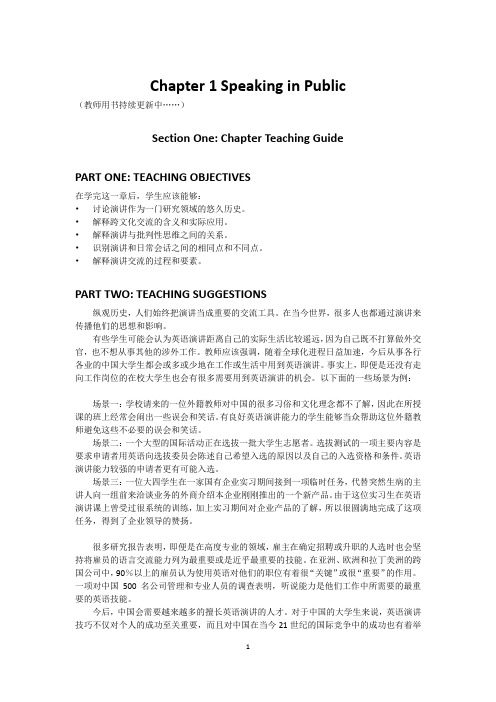
Chapter 1 Speaking in Public(教师用书持续更新中……)Section One: Chapter Teaching GuidePART ONE: TEACHING OBJECTIVES在学完这一章后,学生应该能够:•讨论演讲作为一门研究领域的悠久历史。
•解释跨文化交流的含义和实际应用。
•解释演讲与批判性思维之间的关系。
•识别演讲和日常会话之间的相同点和不同点。
•解释演讲交流的过程和要素。
PART TWO: TEACHING SUGGESTIONS纵观历史,人们始终把演讲当成重要的交流工具。
在当今世界,很多人也都通过演讲来传播他们的思想和影响。
有些学生可能会认为英语演讲距离自己的实际生活比较遥远,因为自己既不打算做外交官,也不想从事其他的涉外工作。
教师应该强调,随着全球化进程日益加速,今后从事各行各业的中国大学生都会或多或少地在工作或生活中用到英语演讲。
事实上,即便是还没有走向工作岗位的在校大学生也会有很多需要用到英语演讲的机会。
以下面的一些场景为例:场景一:学校请来的一位外籍教师对中国的很多习俗和文化理念都不了解,因此在所授课的班上经常会闹出一些误会和笑话。
有良好英语演讲能力的学生能够当众帮助这位外籍教师避免这些不必要的误会和笑话。
场景二:一个大型的国际活动正在选拔一批大学生志愿者。
选拔测试的一项主要内容是要求申请者用英语向选拔委员会陈述自己希望入选的原因以及自己的入选资格和条件。
英语演讲能力较强的申请者更有可能入选。
场景三:一位大四学生在一家国有企业实习期间接到一项临时任务,代替突然生病的主讲人向一组前来洽谈业务的外商介绍本企业刚刚推出的一个新产品。
由于这位实习生在英语演讲课上曾受过很系统的训练,加上实习期间对企业产品的了解,所以很圆满地完成了这项任务,得到了企业领导的赞扬。
很多研究报告表明,即便是在高度专业的领域,雇主在确定招聘或升职的人选时也会坚持将雇员的语言交流能力列为最重要或是近乎最重要的技能。
演讲的艺术第十五版课后答案chapter4

演讲的艺术第十五版课后答案chapter4 如果你正在从事演讲的职业:演讲选手、教师、广告人员、记者或其它有关人士(无论男女)。
这将对你产生巨大积极影响。
“我可以做到”——你也许认为这是一句很平常的话。
但如果你能这样做就大不一样了。
因为你认为,要成功地获得观众的心和喜爱你得首先能做到这一点。
当你对观众说:“您说这是一件非常棒的事情……”时,他们会对你投以热烈而惊讶的目光,并会把他们引向你想要表达的意思——对他们来说那绝对是一个非常棒的主意。
对于这一点他们会产生一种愉快心情并乐于把自己交给你。
一、分析演讲成功的因素成功取决于三个要素:一个良好的自我控制能力,一个正确的心态。
自我控制能力指的是要有意识地调整自己的心理状态。
心态则是人们在演讲时最能控制情绪。
只有保持好心态才能使自己发挥最大潜力。
一个好的心态能够激发出听众的热情和渴望,能够使他们在欣赏你的表演时产生愉悦感并乐意把自己交给你。
一个良好的心态使观众能够通过你演讲表达自己的情感和观点。
所以要学会自我控制。
1、自我控制自我控制是演讲稿的核心。
演讲者有明确的演讲稿的主题,必须在主题范围内表达自己的观点,突出重点。
因为听众在欣赏你演讲时,既欣赏内容的严肃性,又欣赏演讲者的勇气和技巧。
在不同的场合演讲者应该有不同的演讲稿来进行比较,既要避免大篇幅文字的叙述,也要注意小篇幅语言(小至只有5、6行)的介绍。
如果演讲者对一件事完全失去了控制能力,那么会引起听众的反感与厌恶,使演讲效果大打折扣。
在演讲者演讲前要做好充分准备,对自己的知识、技巧、情感、目标、时间、场合、内容等进行认真分析,然后才有可能去进行演讲。
因此,演讲者在完成一篇演讲提纲之前,必须做好充分准备。
2、自我评价人们可以通过评价自己的言行来判断其表现水平。
演讲时,演讲者要有一种对自己的表现的客观评价。
这种评价是在实践中形成的。
有一些演讲者良好的品德和较高的技巧以及良好的心理素质对自己做了客观评价:他们在演讲时感到信心十足,他们希望观众给予他们支持。
《魏斯曼的演讲大师课 全三册 》读书笔记思维导图

这套书是所有人在准备商务演讲时的案头书,当你逐条做到书中给出的建议时,就一定能够打造一场近乎完 美的演讲。
魏斯曼的演讲大师课1:说的 艺术
01
各方赞誉
02
中文版序
03
新版前言
04
初版前言
06
第一部分 演讲,说 服的艺术
05
引言 奇 迹魔法师
第二部分 让 1
PPT与演讲完 美结合
第三部分 让 2
02
第一部分 让演讲引 人入胜的 秘密
03
第二部分 设计为演 讲赋能的 PPT
04
第三部分 让演讲更 有力量的 表达技巧
05
第四部分 应对挑战 性问题的 八项建议
06
第五部分 特殊的演 讲训练
感谢观看
读
书
笔
记
第68章 尝试进行 一场有讲 稿的演讲
04
第69章 用对话的 方式与听 众交流
05
第70章 敢于与演 示恶魔作 斗争
06
第71章 别被讨论 会累死
第72章 练就你的 纯正口音
第73章 像电视新 闻主持人那样进 行采访
第74章 设计一场 成功的IPO路演
第75章 结语:时 间无尽,边界无 疆
01
引言 一 切顺乎自 然的东西 都是美好 的
对挑战性问题 的八项建议
第五部分 特 2
殊的演讲训练
3
译者后记
4
E PA 介 绍
5
参考文献
01
第1章 怎 样记住自 己的演讲 内容?
02
第2章 简 单才是终 极的复杂
03
第3章 一 次演讲多 长时间最 合适?
04
第4章 直 击听众的 根本需求
《演讲的艺术1》

important in determining how you handle the mater iiaall..
3. Factors in Audience Analysis
Hale Waihona Puke 3. Factors in Audience Analysis
Disposition Toward the topic
(1) Interest
—people don ’t usually expend the time and effort to
attend a speech unless they have some interested in the topic .
audience , you can adjust your speech to address their concerns or to answer their objections aga inst your point of view .
Disposition Toward the Speaker :
Size :
—No matter what size group you are addressing , bear in mind one basic
principle : The larger the audience , the more formal your presentation must be .
steps to get your classmates involved , e . g . by an arresting intro duct
- 1、下载文档前请自行甄别文档内容的完整性,平台不提供额外的编辑、内容补充、找答案等附加服务。
- 2、"仅部分预览"的文档,不可在线预览部分如存在完整性等问题,可反馈申请退款(可完整预览的文档不适用该条件!)。
- 3、如文档侵犯您的权益,请联系客服反馈,我们会尽快为您处理(人工客服工作时间:9:00-18:30)。
One of your first assignments will be to present an introductory speech, either a speech of self-introduction or a speech introducing a classmate. Focus the speech on a limited number of ideas and be creative in developing them. Use interesting supporting materials and present them in colorful, descriptive language.
Chapter2speakingconfidentlyandethically
stage fright is an issue for public speakers in all countries. Rather than trying to eliminate every trace of stage fright, you should try to transform it into positive energy. To some extent, this will happen naturally as you gain experience as a speaker, but you should also think positively, prepare thoroughly, visualize yourself giving a successful speech, remember that most nervousness is not visible to the audience, and think of your speech as communication rather than as a performance in which you must do everything perfectly
Chapter1speakinginpublic
People throughout history have used public speaking as a vital means of communication and empowerment. Because you will live the rest of your life in a globalized world, the need for English public speaking will almost surely touch you at some time.
When organizing the speech, make sure you have a clear introduction, body, and conclusion. Most introductory speeches fall naturally into chronological or topical order. Using clear transitions will help your audience follow you from point to point.
Because public speaking is a form of power, it carries with it heavy ethical responsibili ties. There are four basic guidelines for ethical speechmaking. The first is to make sure your goals are ethically sound. The second is to be fully prepared for each speech. The third is to be honest in what you say. The fourth is to put ethical principles into practice at all times
Although you will write a complete manuscript or outline of your speech when preparing it, you should deliver it extemporaneously. This means you have rehearsed fully and can present your talk from a brief set of speaking notes. Concentrate on establishing eye contact with the audience and on speaking in a dynamic, engaged tonof voice
There are many similarities between public speaking and conversation, but there are also important differences. First, public speaking requires more detailed preparation than ordinary conversation. Second, it requires more formal language. Third, it demands that speakers adjust their voices to the larger audience and work at avoiding distracting physical mannerisms and verbal habits.
Because public speaking involves the use of English as a working language, it requires critical thinking skills. Critical thinking helps you organize your ideas, spot weaknesses in other people’s reasoning, and avoid them in your own.
The general purpose of your speech will usually be to inform or to persuade. When your general purpose is to inform, your goal is to communicate information clearly, accurately, and interestingly. When your general purpose is to persuade, your goal is to win listeners over to your point of view
Chapter4 selecting a topic and purpose
The first step in speechmaking is choosing a topic. If you have trouble picking a topic, you can use clustering, a personal inventory, or an Internet search to come up with something that is right for you.
To be successful giving speeches in English, you need to be culturally competent communicator. You must show respect for the cultural values and expectations of the people who come to hear you. This dose not meanthat you have to devalue your own culture. There is no inherent conflict between being a competent English public speaker and being fully Chinese.
Of all the ethical lapses a speaker can commit, few are more serious than plagiarism lobal plagiarism is lifting a speech entirely from a single source. Patchwork plagiarism involves cutting and pasting a speech from a limited number of sources. Incremental pla giarism occurs when a speaker fails to give credit for specife borrowed from other people
Once you know your topic and general purpose, you must focus on a specific purpose statement that indicates precisely what your speech seeks to achieve. The specific purpose statement should (1) be a full infinitive phrase; (2) be worded as a statement, not a question:(3) avoid figurative language;(4) not be vague or general; (5) be appropriate for your audience; and(6) be achievable in the allotted time.
